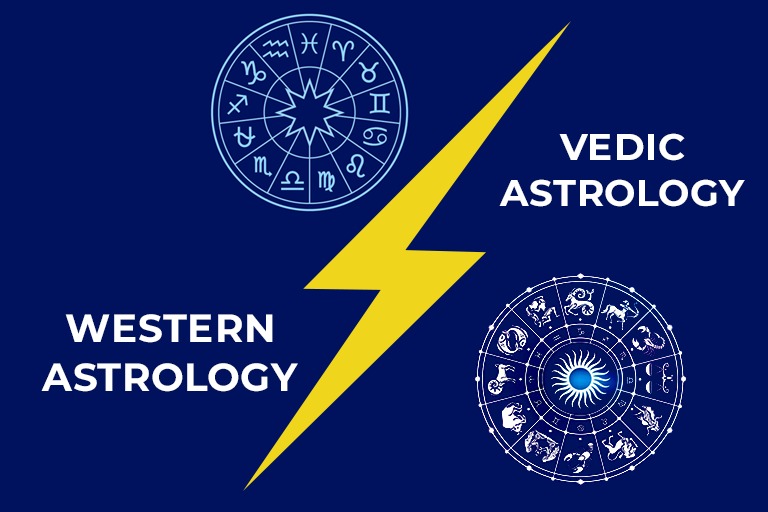Astrology is an invaluable tool for assessing the potential possibilities in our lives. In comparison to Vedic Astrology, which has been practiced for hundreds of years and has written records in the Vedas, Western Astrology is relatively new. Those who study astrology are probably familiar with the more Western features, such as following your daily horoscope zodiac sign, mapping birth charts and divisional charts, and forecasting the full swing of your season. Vedic astrology, commonly known as Hindu astrology, has a different zodiac system than that of Western astrology.
Here, in this blog, we look at both Vedic and Western astrology to have a better knowledge of both. Let’s dive into the principles of Vedic vs Western astrology, from origins to signs, etc.
Western vs. Vedic Astrology
The major difference between Western and Vedic astrology is the employment of separate zodiac systems. The tropical zodiac, which is based on the seasons and the sun’s alignment with the Earth, is used by Western astrologers. Vedic astrology, on the other hand, employs the sidereal zodiac, which is based on the physical placements of the constellations in the sky. While there are some similarities between Vedic and Western astrology, there are also significant differences. Let’s take a look at the main differences between the two astrological systems.
Signs
There are 12 zodiac signs in Western astrology as well as in Vedic astrology. Although the dates differ, both astrological systems use the same names and meanings. So, if you are a flighty and fun Gemini according to Western astrology, you may discover that you have turned into a stubborn but loving Taurus according to Vedic astrology. In Vedic astrology, your rising sign is also very important, although, in Western astrology, the sun sign is everything.
Calendar
Both Western and Vedic astrology use different calendars. In Western astrology, the four seasons and the tropical calendar serve as the guideposts for figuring things out. The calendar in Vedic astrology employs the sidereal system, which emphasizes planetary position based on constellations rather than the set technique used in the Western version.
Planets
Famous Astrologer in Delhi, Tanuj Lalchandani suggests that Western astrology is more concerned with the sun, but Vedic astrology is more concerned with the moon. This is because Western astrology is based on the solar system and the seasons, which are significantly impacted by the sun’s position and movements. Vedic astrology encompasses a broader view of the cosmos as a whole. Vedic astrology also considers the visible planets and their lunar nodes (aka the points of orbit around the earth), but Western astrology considers all of the main planets.
Houses
When it comes to mapping out the houses in the Western and Vedic astrological systems, there are certain similarities and differences as well. Both traditions of astrology believe that the ascendant house (the zodiac rising in the east at the time of our birth) has a significant impact on who we are. The difference in measuring these growing houses, however, is significant. Each house in Vedic astrology is mapped at an equal size, which may affect where your ascendant house falls.
Birth Charts
When it comes to birth charts, there are significant discrepancies between them. The birth chart in Western astrology is based on a circle, with the houses and signs written out anticlockwise. In Vedic astrology, the birth chart is shaped differently: instead of a circle, it is a square divided into 12 pieces.
Key Takeaways
Vedic and Western astrology are both fascinating and can be used to shed insight on how we move through and metabolize life. Horoscopes, birth charts, and the like are all quite important tools for guiding us. As previously stated, by one of the best Vedic astrologers in Delhi, Vedic astrology is thought to be a more extensive, in-depth, and sophisticated interpretation of the two main astrological approaches. It also offers a more flexible perspective, acknowledging that the cosmos, rather than being a fixed thing, is always moving, turning, and changing. As a result, it is said to be more attuned to the natural world and possibly a more accurate reading of where we are spiritually and emotionally. Both, though, have significant value.

